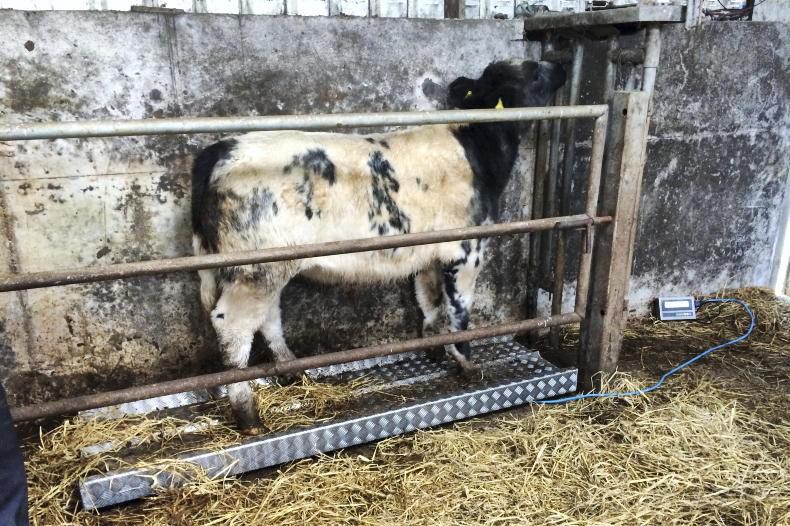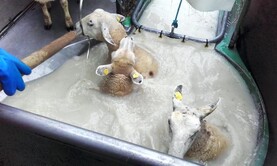The Beef Environmental Efficiency Programme – Suckler, or BEEP-S as it has become commonly known, opened for applications on Tuesday 16 March. The opening of BEEP-S, which offers payment of up to €80 to €90 per eligible cow-calf pair, has been anxiously awaited by farmers with calves born in the latter half of 2020, with these producers keen to record data and assess if the terms and conditions had changed from the 2020 scheme.
The answer to this question is that BEEP-S is broadly similar to the preceding two programmes run in 2019 and 2020. The budget for 2021 has been increased to €40m, owing to the fact that €40.46m was drawn down by 24,430 participants in 2020.
BEEP-S is broadly similar to the preceding two programmes run in 2019 and 2020
The payment rates are unchanged and remain dependent on the completion of a number of measures. The first measure is mandatory and requires each eligible cow-calf unit, whereby the calf (sired by a beef breed) was born in the herd of the applicant between 1 July 2020 and 30 June 2021, to be weighed prior to weaning.
This mandatory task will secure payment of €50 for the first 10 cows in a herd and €40 thereafter up to a maximum of 100 pairs. There is an additional optional payment of €30 per pair for completion of option two, which consists of meal feeding calves or vaccinating calves, and an additional optional payment of €10 per pair for faecal egg count analysis to determine the presence of liver/rumen fluke.
Weighing requirements
Each eligible cow-calf unit must be weighed on the same day, with their weights recorded with the Irish Cattle Breeding Federation (ICBF) between 1 January 2021 and 1 November 2021. Weights taken since 1 January can be recorded retrospectively, but from 1 May 2021, weights must be recorded within seven days of weighing. The options for recording remain the same.
Participants can use their own scales, a borrowed/third party scales or rent a scales from an approved agent. There were in the region of 6,000 scales registered in 2020. Scales used in previous schemes must be pre-registered again before weighing.
Participants are encouraged to record the weighing data electronically through ICBF or other farm software packages, but postal copies can also be submitted. These forms can be printed from the ICBF website or requested from ICBF.
Additional measures
Under option two, farmers can select the option of meal feeding calves pre-and-post weaning or vaccination of calves. Under the first option, meal feeding must be offered at least four-weeks pre-weaning and at least two weeks post-weaning, with the measure designed to reduce stress on calves at weaning time.
Receipts, invoices and labels of all compound feedstuffs, and/or straights (feed materials) and complementary mineral mixtures purchased must be retained and made available for inspection and administrative check.
With regards to vaccination, farmers must implement a vaccination programme for respiratory diseases in suckler calves and record the details of vaccination.
Detailed advice can be found in the terms and conditions, with the advice also given to consult your vet when planning a vaccination programme. In general, the terms and conditions list applicants must choose one of the following vaccination protocols:
Option one – (if there is a short time before risk period or if cattle can only be handled once):
Single RSV and Pi3 Intranasal two to four weeks before weaning/housing/sale.At the same time, a single (or two-dose programme) IBR live intra-muscular injection two to four weeks before weaning/housing/sale.Option two – (if there is more time before risk period or a broader coverage, including bacteria, is required):
First subcutaneous injection of RSV, Pi3 and Mannhaemia haemolytica dead, six to eight weeks before weaning/housing/sale.Second subcutaneous injection of RSV, Pi3 and Mannhaemia haemolytica dead, two to four weeks before weaning/housing/sale.At the same time as the second injection, a single IBR live intra-muscular, two to four weeks before weaning/housing/sale.The final optional measure is faecal egg testing to control liver and rumen fluke. Under this measure, at least 10 samples must be taken and submitted to an approved laboratory, of which there are currently six, before 1 October 2021.
Application procedure
The application can only be submitted through the Department of Agriculture’s agfood.ie facility. This can be completed via a producers own account or via an authorised agent. Where an agent was authorised to submit an application in a previous year’s scheme, this authorisation will remain in place. The deadline for submission is 23.59pm on Monday 26 April 2021.
The Department stresses that applicants must ensure they have selected the correct options, as errors and omissions cannot be rectified later. They also highlight that issues have arisen in recent years where an application has been completed but the submit button has not actually been pressed prior to exiting the system, meaning these applications were not submitted. Once submitted, the status will change to ‘application submitted online’.
The Beef Environmental Efficiency Programme – Suckler, or BEEP-S as it has become commonly known, opened for applications on Tuesday 16 March. The opening of BEEP-S, which offers payment of up to €80 to €90 per eligible cow-calf pair, has been anxiously awaited by farmers with calves born in the latter half of 2020, with these producers keen to record data and assess if the terms and conditions had changed from the 2020 scheme.
The answer to this question is that BEEP-S is broadly similar to the preceding two programmes run in 2019 and 2020. The budget for 2021 has been increased to €40m, owing to the fact that €40.46m was drawn down by 24,430 participants in 2020.
BEEP-S is broadly similar to the preceding two programmes run in 2019 and 2020
The payment rates are unchanged and remain dependent on the completion of a number of measures. The first measure is mandatory and requires each eligible cow-calf unit, whereby the calf (sired by a beef breed) was born in the herd of the applicant between 1 July 2020 and 30 June 2021, to be weighed prior to weaning.
This mandatory task will secure payment of €50 for the first 10 cows in a herd and €40 thereafter up to a maximum of 100 pairs. There is an additional optional payment of €30 per pair for completion of option two, which consists of meal feeding calves or vaccinating calves, and an additional optional payment of €10 per pair for faecal egg count analysis to determine the presence of liver/rumen fluke.
Weighing requirements
Each eligible cow-calf unit must be weighed on the same day, with their weights recorded with the Irish Cattle Breeding Federation (ICBF) between 1 January 2021 and 1 November 2021. Weights taken since 1 January can be recorded retrospectively, but from 1 May 2021, weights must be recorded within seven days of weighing. The options for recording remain the same.
Participants can use their own scales, a borrowed/third party scales or rent a scales from an approved agent. There were in the region of 6,000 scales registered in 2020. Scales used in previous schemes must be pre-registered again before weighing.
Participants are encouraged to record the weighing data electronically through ICBF or other farm software packages, but postal copies can also be submitted. These forms can be printed from the ICBF website or requested from ICBF.
Additional measures
Under option two, farmers can select the option of meal feeding calves pre-and-post weaning or vaccination of calves. Under the first option, meal feeding must be offered at least four-weeks pre-weaning and at least two weeks post-weaning, with the measure designed to reduce stress on calves at weaning time.
Receipts, invoices and labels of all compound feedstuffs, and/or straights (feed materials) and complementary mineral mixtures purchased must be retained and made available for inspection and administrative check.
With regards to vaccination, farmers must implement a vaccination programme for respiratory diseases in suckler calves and record the details of vaccination.
Detailed advice can be found in the terms and conditions, with the advice also given to consult your vet when planning a vaccination programme. In general, the terms and conditions list applicants must choose one of the following vaccination protocols:
Option one – (if there is a short time before risk period or if cattle can only be handled once):
Single RSV and Pi3 Intranasal two to four weeks before weaning/housing/sale.At the same time, a single (or two-dose programme) IBR live intra-muscular injection two to four weeks before weaning/housing/sale.Option two – (if there is more time before risk period or a broader coverage, including bacteria, is required):
First subcutaneous injection of RSV, Pi3 and Mannhaemia haemolytica dead, six to eight weeks before weaning/housing/sale.Second subcutaneous injection of RSV, Pi3 and Mannhaemia haemolytica dead, two to four weeks before weaning/housing/sale.At the same time as the second injection, a single IBR live intra-muscular, two to four weeks before weaning/housing/sale.The final optional measure is faecal egg testing to control liver and rumen fluke. Under this measure, at least 10 samples must be taken and submitted to an approved laboratory, of which there are currently six, before 1 October 2021.
Application procedure
The application can only be submitted through the Department of Agriculture’s agfood.ie facility. This can be completed via a producers own account or via an authorised agent. Where an agent was authorised to submit an application in a previous year’s scheme, this authorisation will remain in place. The deadline for submission is 23.59pm on Monday 26 April 2021.
The Department stresses that applicants must ensure they have selected the correct options, as errors and omissions cannot be rectified later. They also highlight that issues have arisen in recent years where an application has been completed but the submit button has not actually been pressed prior to exiting the system, meaning these applications were not submitted. Once submitted, the status will change to ‘application submitted online’.






 This is a subscriber-only article
This is a subscriber-only article











SHARING OPTIONS: